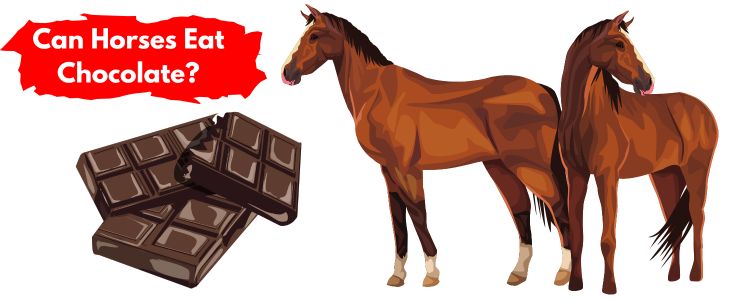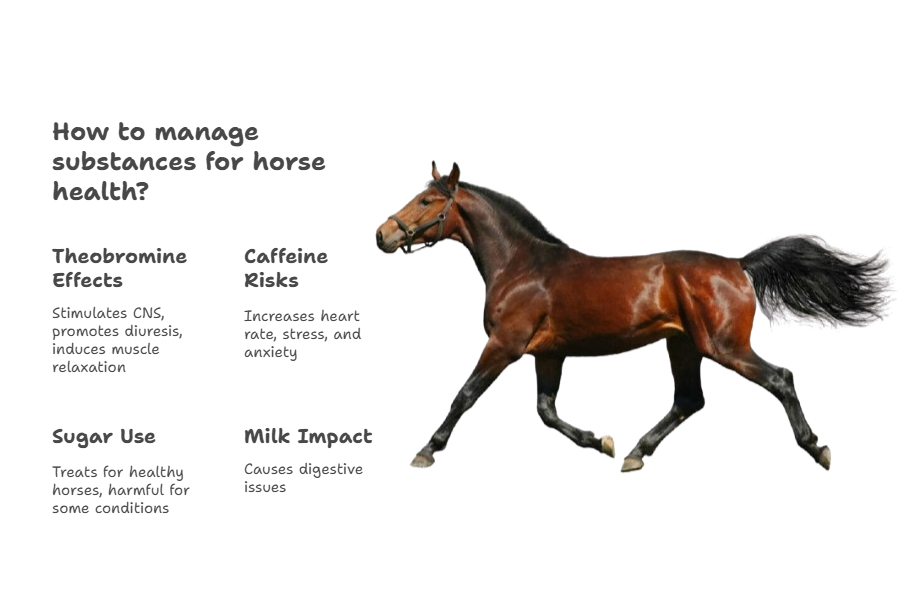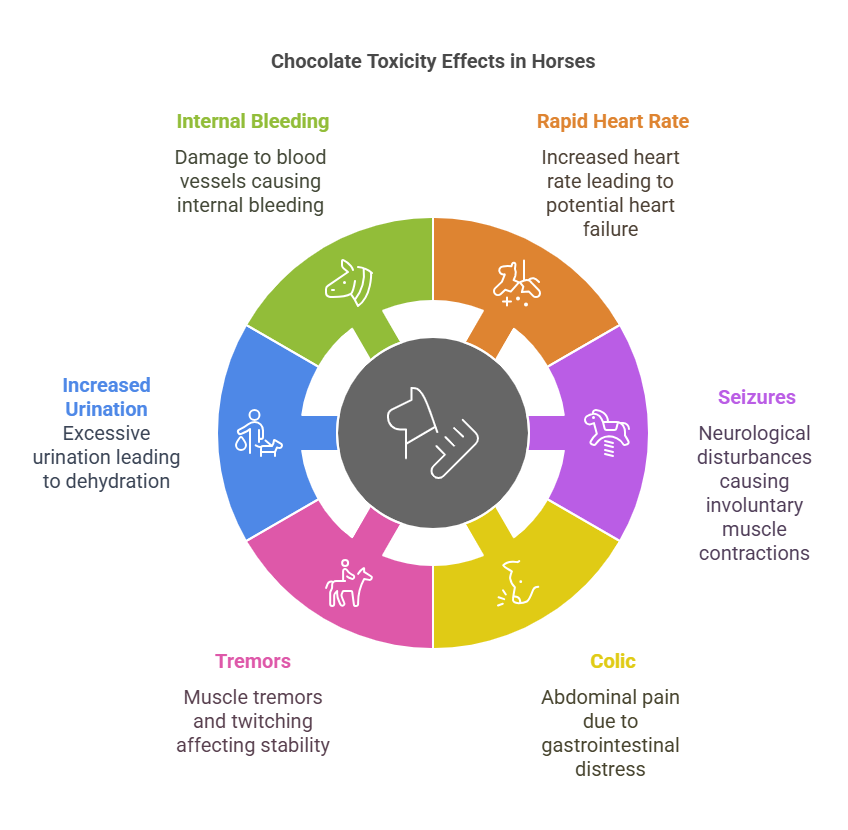No, Horses must not eat chocolate because it contains theobromine, a toxic substance that can lead to severe health issues. Horses love treats. Many owners give them carrots, apples, or special horse cookies. But what about chocolate? Chocolate is a widespread human snack, but can horses eat it safely? Let’s break it down.
Why Chocolate is Dangerous for Horses
Chocolate contains theobromine. This compound is toxic to horses. Theobromine affects the nervous system and heart. Even small amounts can cause serious health problems.
According to the American Veterinary Medical Association (AVMA), chocolate is toxic to many animals, including horses.
Dr. Nancy Turner, a veterinary toxicologist, says,
“Even a small amount of theobromine can affect a horse’s health, leading to serious complications.”
Here’s a look at the key ingredients in chocolate and why they can harm horses.
Theobromine
Theobromine is a naturally occurring compound found in cacao plants and cocoa beans. In its raw form, it has a bitter taste.
Theobromine can affect multiple organ systems in horses in the following ways:
- Stimulates the central nervous system, cardiac system, and skeletal muscles
- Promotes diuresis (increased urine output through the kidneys)
- Induces smooth muscle relaxation
Caffeine
Caffeine is a stimulant that some individuals have reportedly used to “hype up” horses before races or competitions—an illegal practice.
Excessive caffeine consumption can lead to:
- Increased heart rate
- Elevated stress and anxiety levels
High stress and anxiety in horses can contribute to serious health issues, including gastric ulcers and colic, a painful abdominal condition.
Sugar
Sugar is not inherently toxic to healthy horses, and many owners feed their horses sugar cubes as treats. However, sugar can be harmful to horses with specific medical conditions, such as:
- Equine metabolic syndrome
- Cushing’s disease
- Polysaccharide storage myopathy (PSSM)
Milk
Although not as harmful as theobromine or caffeine, the milk in chocolate can still cause digestive issues in horses.
Effects of Chocolate on Horses
Horses should never be fed chocolate as it contains theobromine, a toxic compound that can cause severe health issues. The effects of chocolate poisoning in horses include:
1. Rapid Heart Rate (Tachycardia)
Chocolate consumption can cause an increase in heart rate due to theobromine’s stimulant properties. This can lead to irregular heart rhythms (arrhythmias) and even heart failure in severe cases. Horses have highly sensitive cardiovascular systems, and any significant increase in heart rate can put excessive strain on their bodies.
2. Seizures
Ingesting chocolate can lead to neurological disturbances in horses, such as seizures. Theobromine affects the central nervous system by overstimulating nerve cells, leading to involuntary muscle contractions, tremors, and seizures. These can be life-threatening if not treated promptly.
3. Colic
Colic is a general term for abdominal pain in horses, often caused by digestive upset. Chocolate consumption can lead to gastrointestinal distress, causing symptoms such as bloating, severe stomach pain, and difficulty passing stool. Horses have a sensitive digestive system, and even small amounts of chocolate can disrupt their gut health.
4. Tremors
Theobromine acts as a stimulant on the nervous system, causing muscle tremors or twitching. This uncontrolled shaking can make the horse weak, anxious, and unsteady on its feet. If the toxicity level is high, tremors can worsen into full-body convulsions.
5. Increased Urination (Polyuria)
Chocolate contains caffeine, which has a diuretic effect, leading to increased urination. This can cause dehydration, electrolyte imbalances, and additional stress on the kidneys. Horses already require a well-balanced hydration system, and excessive urination can lead to further complications.
6. Internal Bleeding
In severe cases, chocolate toxicity can cause damage to the blood vessels, leading to internal bleeding. This occurs due to theobromine’s effect on platelet function and clotting mechanisms. Signs of internal bleeding include weakness, pale gums, and blood in urine or feces, which require immediate veterinary attention.
The severity depends on the type and amount of chocolate consumed. Dark chocolate has more theobromine than milk chocolate. Even a little can be harmful.
How Much Chocolate is Toxic?
There is no exact safe amount. Any chocolate is a risk. Studies show that as little as 1 mg per kg of theobromine can cause mild symptoms in animals. Higher doses can be deadly. Source
Can Chocolate Affect Performance Horses?
Yes. The United States Equestrian Federation (USEF) bans chocolate for competition horses. Theobromine is considered a performance-enhancing substance. If a horse tests positive, it can lead to disqualification.
Accidental Chocolate Ingestion – What to Do?
If your horse eats chocolate, act fast:
- Remove any remaining chocolate.
- Call a vet immediately.
- Monitor symptoms like restlessness, sweating, or tremors.
- Provide fresh water to help flush toxins.
- Avoid home remedies and follow professional advice.
Safe Treat Alternatives
Instead of chocolate, offer:
- Apples – Sweet and crunchy, horses love them.
- Carrots – Full of nutrients and horse-safe.
- Bananas – A tasty source of potassium.
- Pumpkin – Good for digestion.
- Peppermints – A fun, safe treat in moderation.
Myths About Horses and Chocolate
1. A Little Chocolate is Fine
Even small amounts can cause problems. No chocolate is safe.
2. White Chocolate is Okay
White chocolate has less theobromine, but it’s still unsafe.
3. Chocolate Helps Calm Horses
There’s no proof that chocolate calms horses. It can make them hyper or sick.
FAQs
1. Can horses eat chocolate chip cookies?
No. Even small traces of chocolate are harmful.
2. What should I do if my horse eats chocolate accidentally?
Call a vet immediately. Watch for symptoms and provide fresh water.
3. Is cocoa powder dangerous for horses?
Yes. Cocoa powder has high levels of theobromine. It is very toxic.
4. Can horses eat chocolate-flavored treats?
No. Even artificial chocolate flavoring may contain harmful substances.
5. What if my horse had chocolate years ago and was fine?
That was a lucky situation. The risk is always there. It’s best to avoid it completely.
Bottom Line
Chocolate is toxic to horses. It contains theobromine, which affects their heart and nervous system. Even a small amount can be dangerous. Stick to horse-safe treats like apples, carrots, and bananas. If your horse eats chocolate, contact a vet immediately.



